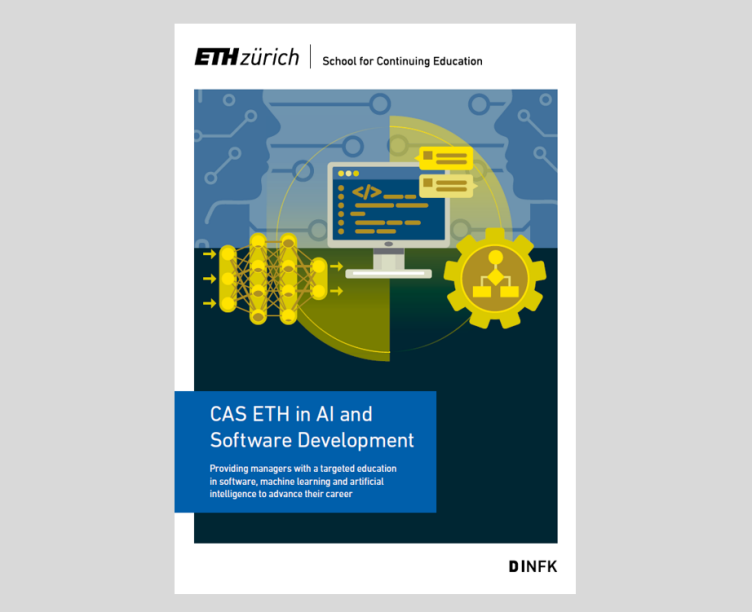CAS AI & Software Development
Providing a targeted technical education in software and artificial intelligence to advance the careers of industry managers
Organisations are changing rapidly to become more digital. At the centre of this transformation is the use of software and machine learning to generate novel business applications. Increasingly, these also involve other forms of AI such as generative and agentic AI. Managers without any formal training in these areas are being asked to make critical resource allocation and operational decisions related to software and AI that can have significant impacts on corporate competitiveness. The risks and rewards of this decision making have never been higher. This is where the CAS in AI and Software Development (CAS AIS) comes in.
The CAS AIS provides a targeted education in software engineering and artificial intelligence (AI) to business managers in order to advance their career. The aim of this programme is to improve the decision-making of managers by providing them with fundamental training in these areas that is applicable across multiple industries and areas of the organisation.
The target audience for this program is managers with any educational background and a minimum of five years of professional experience who need to make technology-related decisions in their companies. A prior technical degree is not required, but some prior programming and machine learning experience is needed (see technical prerequisites below). It is appropriate both for people with non-technical backgrounds (degrees in business, economics, law, social sciences, etc.) and for people with technical backgrounds who have gaps or want to refresh their knowledge with fundamental technical training in these areas.
Graduates will be able to communicate better and develop stronger relationships with software and AI development teams. In turn, this will enable them to extend their existing management skills to take on more challenging leadership roles in interdisciplinary projects with significant software and AI components.
If you are also looking at our other CAS and trying to decide which one to follow first, please read our guidance on the CAS Programmes overview page.
In the video below, you can learn what a participant from the 2024 CAS AIS thinks about the programme. More testimonials from CAS AIS participants can be found on the Participants page. More details about the CAS AIS programme are further below.
*Note: This is the only CAS in our MAS program that has technical prerequisites. Please review them before applying to the CAS and contact us if you have any questions or concerns.
Course descriptions
Lecturers: Dr. Lukas Fässler & Dr. Markus Dahinden
Programming with Python reinforces and extends basic programming concepts covered previously in the CAS in Data and Machine Learning (CAS DML) and introduces several new topics. These new topics include classes, objects, and a selection of important Python libraries, such as NumPy for matrix calculations as well as Pandas and Requests for data science and data visualization. Participants will develop their Python programming skills over the entire CAS with online tutorials, programming exercises, and individual support.
Lecturers: Dr. Malte Schwerhoff & Dr. Hermann Lehner (Spring semester), Dr. Marcel Lüthi & Dr. Carlos Cotrini (Fall semester)
This course provides a comprehensive overview of the software development process, introducing participants to essential techniques for facilitating the delivery of high-quality software products. The knowledge and practical experience gained will help managers to improve communication with software development teams, ultimately leading to higher success rates.
We will examine the different stages of software development and lifecycle to better understand the challenges of managing software development projects, and the principles and processes used to address them. This will include topics such as requirements elicitation, modelling, design patterns, implementation decisions and trade-offs, testing, refactoring, and maintenance and enhancement of software products. A team project will give participants the opportunity to apply the techniques introduced and to experience common software development challenges first-hand: for example, difficulties in eliciting technically meaningful requirements, integrating change requests, and managing an evolving code base. In this course, we will reverse the roles: participants will take on the task of delivering high quality software under our supervision. In this way, participants will gain a deeper understanding of the challenges of software development.
Lecturers: Dr. Carlos Cotrini Jiminez & Dr. Andreas Streich
This course provides fundamental training in areas of machine learning and artificial intelligence. The course is intended for managers who want to understand how ML and AI are reshaping industries.
We will cover the following topics:
- Machine Learning: Discover the transformative role of neural networks, learn about computer vision and reinforcement learning.
- We put an emphasis on natural language processing (NLP), and study domains like machine translation and generative AI.
- Applications: Learn how Artificial intelligence is revolutionizing sectors like finance, insurance, retail, and services.
- Challenges & Considerations: Recognize the potential pitfalls, threats, and ethical considerations in developing and deploying AI systems.
- The Future of AI: Engage in discussions on the societal impacts and future prospects of AI.
Additional information
Participants complete 3 modules over 4-5 months. Courses are generally conducted in either a block format or blended learning format to minimize time away from work. Classes are held at ETH Zentrum campus on seven weekends, each consisting of one full day (Friday) and one half-day (Saturday morning). Thus, this CAS is well suited as a part-time study programme.
Workload is approximately 300 hours.
Study language is 100% English.
CAS AIS applicants must satisfy the following requirements:
- ETH recognised university degree at Master level or equivalent educational background
A bachelor degree can be exceptionally considered sur dossier.
- Demonstrated managerial experience
At least 5 years of professional work experience that includes some experience with allocation of corporate resources, e.g. line management, project management, etc.
- Good knowledge of English
At least B2 level is recommended.
Additional technical prerequisites are described below. MAS AID participants and applicants have priority over CAS only applicants. Applications will be reviewed by the Admission Committee. The final decision is communicated by the School for Continuing Education.
The following technical skills are required for admission to the CAS AIS. Completion of the CAS in AI, Data and Machine Learning satisfies these technical prerequisites.
Programming
- Understand and explain using correct technical language the meaning of terms such as source code, bit sequence, ASCII characters, program console, scope of variables, runtime errors.
- Work with variables, data types, list comprehension, if/for/while, operators, user input, functions, parameters, return values, files, random numbers in Python.
- Understand the basics of SQL.
Machine Learning
- Understand data acquisition, biases, and learning as generalization.
- Program simple steps to prepare and visualize data.
- Explain over- and underfitting, supervised vs. unsupervised learning, regression, classification, clustering, dimensionality reduction, neural networks, limits of machine learning.
- Design training and testing methods in these contexts and realize them using standard algorithms from Python libraries.
Please apply online through the School for Continuing Education website. After submitting the application and uploading supporting documentation, you will be asked to pay the non-refundable application fee of CHF 50 or CHF 150 depending on where you obtained your degree.
Application periods: 1 - 31 May (Fall start) and 1 - 30 November (Spring start)
The tuition fee is 8,500 CHF and includes costs for software licenses, materials, etc. There are no other fees.
Applicants will receive an email notifying them when the admission decision letter is available for download in their eApply account. Admitted applicants do not need to confirm their intention to participate in the programme. A separate email will be sent with instructions on how to set up their ETH email and access their ETH student account (myStudies). All subsequent communication will be via the ETH email account.
To withdraw, the admitted participant must notify the School for Continuing Education by email (). Withdrawal is subject to the following fees.
- Free of charge: within 30 days from the date of the admission decision letter and before the beginning of the programme.
- CHF 3,500: more than 30 days after the admission date and before the beginning of the programme.
- CHF 8,500: after the start of the programme.
The CAS AIS tuition fees and ECTS can be fully credited towards the MAS in AI and Digital Technology. Successful graduates of the CAS AIS who wish to continue can apply to the MAS in the same manner as any other applicant. Prior completion of CAS will be considered during the application review, but there is no automatic right of admission to the MAS after completing individual CAS programmes.
The ETH programme regulations governing the CAS in AI & Software Development can be downloaded using this link.
Interested in applying?
The application periods for the CAS in AI & Software Development (CAS AIS) are November 1 - 30 with classes starting in February and May 1 - 31 with classes starting in September.
Questions
If you need more information, please contact us:

